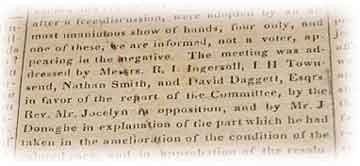 |
Town-GownThe
"Negro" College
Town-GownThe
"Negro" College
|
Why It Failed
While minutes of the town meeting do not survive, there remain many newspaper editorials and articles, letters to the editor, and personal recollections that allow us to reconstruct the reason why the "Negro college" was stopped. Almost all the newspaper reports of the meeting, whether favoring or opposing higher education for black people, suggest that the proposal was defeated with the protection of Yale College in mind (113). A day before the meeting, New Haven's Connecticut Journal editorialized:
The newspaper report describing the meeting concluded,
Connecticut's Middletown Gazette concurred:
The Boston Courier identified Yale's connections with the South as particularly important:
The second resolution at the Town Meeting suggests one reason why Yale's connections with the South might have led to the rejection of the "Negro college": Northern education for black people threatened the Southern slaveholding states, because educated northern black people might sow dissension among their Southern brethren. As the Vermont Telegraph scathingly described it:
The current Senior Fellow of the Yale Corporation, Kurt Schmoke, in an article published in 1971, called the response to the "Negro college" by New Haven "vicious and brutal." He decried "the bitter racist feelings held by New Haveners, especially during the Negro college incident. Sins as well as virtues played a part in the history of New Haven" (114). In the 1830s, New Haven was indeed racially polarized. But New Haven cannot be understood apart from Yale. The responsibility for preventing the "Negro college" from opening its doors must be shared by all. Beyond the individual racism of those attending the town meeting on September 10, 1831, there were other motivations, including Yale's close relationships with the South and the use of colonizationist arguments to oppose the idea of racial integration. Why It MatteredMany months of violence followed the New Haven town meeting. The day after the meeting, a mob of white people attacked Arthur Tappan's house. In October, there were similar raids in New Liberia, a black community in New Haven (131). At least two Yale graduates from this time reacted by become strong abolitionists: Charles Torrey and Cassius Clay. Others would become Confederate officers. As for Simeon Jocelyn, "Jocelyn was forced to stop officiating at the African Church in 1834, and three years later, a mob attacked his residence" (132). Nevertheless, Jocelyn continued working for racial justice in New Haven, building a racially integrated neighborhood in what would later become "Trowbridge Square." Simeon Jocelyn and his brother, Nathaniel, also served as "conductors" on the underground railroad, ferrying fugitive slaves north to safer areas (133). New Haven's Connecticut Journal printed statements from other cities that followed New Haven's example and stopped the Philadelphia Convention's attempt to establish schools or colleges (134). The first college established for African-Americans in the U.S. was "Lincoln University," established in Pennsylvania in 1854. For twenty-two years after New Haven stopped Jocelyn's proposed "Negro college" from opening its doors, there remained no African-American institution of higher education (135). James Pennington, an escaped slave, moved to New Haven classes after hearing Jocelyn speak about his dream of a "Negro college." He audited classes at Yale from 1834-38, though Yale would not permit him to enroll officially or to use the library. "No blacks attended Yale College as students" explained Yale historian George Pierson, "until after the Civil War when Edward Alexander Bouchet earned his B.A. with the class of 1874" (136).
|
|
